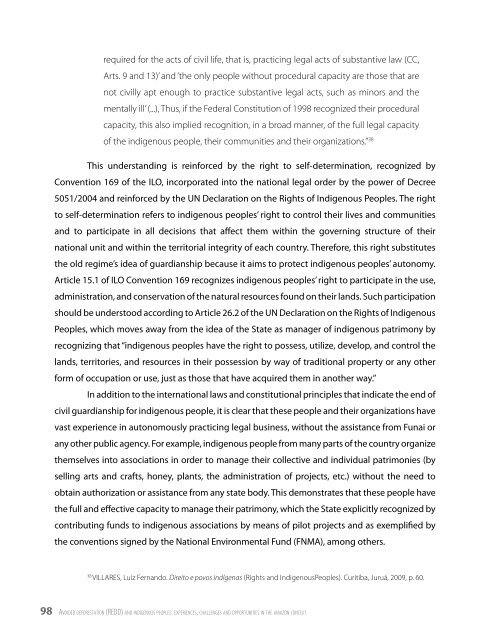Avoided Deforestation (REDD) and Indigenous ... - Amazon Fund
Avoided Deforestation (REDD) and Indigenous ... - Amazon Fund
Avoided Deforestation (REDD) and Indigenous ... - Amazon Fund
You also want an ePaper? Increase the reach of your titles
YUMPU automatically turns print PDFs into web optimized ePapers that Google loves.
equired for the acts of civil life, that is, practicing legal acts of substantive law (CC,<br />
Arts. 9 <strong>and</strong> 13)’ <strong>and</strong> ‘the only people without procedural capacity are those that are<br />
not civilly apt enough to practice substantive legal acts, such as minors <strong>and</strong> the<br />
mentally ill’ (...), Thus, if the Federal Constitution of 1998 recognized their procedural<br />
capacity, this also implied recognition, in a broad manner, of the full legal capacity<br />
of the indigenous people, their communities <strong>and</strong> their organizations.” 38<br />
This underst<strong>and</strong>ing is reinforced by the right to self-determination, recognized by<br />
Convention 169 of the ILO, incorporated into the national legal order by the power of Decree<br />
5051/2004 <strong>and</strong> reinforced by the UN Declaration on the Rights of <strong>Indigenous</strong> Peoples. The right<br />
to self-determination refers to indigenous peoples’ right to control their lives <strong>and</strong> communities<br />
<strong>and</strong> to participate in all decisions that affect them within the governing structure of their<br />
national unit <strong>and</strong> within the territorial integrity of each country. Therefore, this right substitutes<br />
the old regime’s idea of guardianship because it aims to protect indigenous peoples’ autonomy.<br />
Article 15.1 of ILO Convention 169 recognizes indigenous peoples’ right to participate in the use,<br />
administration, <strong>and</strong> conservation of the natural resources found on their l<strong>and</strong>s. Such participation<br />
should be understood according to Article 26.2 of the UN Declaration on the Rights of <strong>Indigenous</strong><br />
Peoples, which moves away from the idea of the State as manager of indigenous patrimony by<br />
recognizing that “indigenous peoples have the right to possess, utilize, develop, <strong>and</strong> control the<br />
l<strong>and</strong>s, territories, <strong>and</strong> resources in their possession by way of traditional property or any other<br />
form of occupation or use, just as those that have acquired them in another way.”<br />
In addition to the international laws <strong>and</strong> constitutional principles that indicate the end of<br />
civil guardianship for indigenous people, it is clear that these people <strong>and</strong> their organizations have<br />
vast experience in autonomously practicing legal business, without the assistance from Funai or<br />
any other public agency. For example, indigenous people from many parts of the country organize<br />
themselves into associations in order to manage their collective <strong>and</strong> individual patrimonies (by<br />
selling arts <strong>and</strong> crafts, honey, plants, the administration of projects, etc.) without the need to<br />
obtain authorization or assistance from any state body. This demonstrates that these people have<br />
the full <strong>and</strong> effective capacity to manage their patrimony, which the State explicitly recognized by<br />
contributing funds to indigenous associations by means of pilot projects <strong>and</strong> as exemplified by<br />
the conventions signed by the National Environmental <strong>Fund</strong> (FNMA), among others.<br />
38 VILLARES, Luiz Fern<strong>and</strong>o. Direito e povos indígenas (Rights <strong>and</strong> <strong>Indigenous</strong>Peoples). Curitiba, Juruá, 2009, p. 60.<br />
98 Av o i d e d d e f o re s t A t i o n (redd) A n d i n d i g e n o u s p e o p l e s: experiences, chAllenges A n d o p p o r t u n i t i e s in t h e A m A zo n c o n t e x t
















